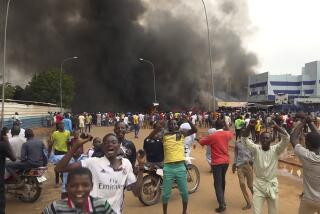Insists White House Has Been Kept Fully Informed : Sununu Expects Noriega Will Go
- Share via
WASHINGTON — White House Chief of Staff John H. Sununu offered “8-to-5” odds Saturday that Panamanian strongman Manuel A. Noriega would be out of power within six months.
Sununu, interviewed on Cable News Network’s Evans and Novak program, made the statement after defending the Bush Administration’s handling of the U.S. response to the attempted coup against Noriega last Tuesday.
“We certainly would like to see him out. The President has said he wants him out, and I can’t believe that between the will of the people of Panama, and the will of the people of the United States, we can’t achieve that,” the former New Hampshire governor said.
“I’m not in the business of making predictions,” he added, “but if you want odds, I’d say 8-to-5 that he probably will be out.”
Sununu maintained that the White House had received full information throughout the abortive revolt by officers of Noriega’s Panamanian Defense Forces and that he would not shift crisis management from the Pentagon to the White House to improve coordination.
Congressional critics have insisted that faulty intelligence and tangled lines of authority barred effective U.S. action during the attempted overthrow.
Sununu denied reports that he was dissatisfied with the handling of the situation, during which U.S. forces blocked some access roads but failed to cut off other routes used by loyalist troops to reach the besieged PDF headquarters and rescue Noriega.
Critics have said a communications gap prevented President Bush from ordering U.S. seizure of Noriega while he was briefly in rebel hands. Sununu indicated that the assessment was accurate.
Asked if Bush would have sent in U.S. troops had he known that Noriega--under indictment in a Florida federal court for drug trafficking--was a captive, the chief of staff suggested that a similar situation in the future would meet with a different response.
“If there had been a high probability earlier that Gen. Noriega was there and a communication that would have made it clear that there would not have been resistance from those who had taken him in our taking it over, we could have started the decision-making process and perhaps moved in that direction,” he said.
Sununu also signaled that other Latin American governments should not regard the Panama performance as an indication of future action. Asked if the Sandinista regime in Nicaragua could now disregard U.S. pressure for a free election there next February, Sununu replied:
“If they do make that assumption and not have a fair election, I think they’re going to be surprised, not only by the U.S. reaction, but the reaction around the world.”
Sununu emphasized that in both Panama and Nicaragua, the Administration sees political pressure rather than military action as the primary instrument of change.
“The long-range interest of this country and of the Western world is that what we get is a concerted pressure on Noriega and a concerted pressure on the regime in Nicaragua,” he said. “That has achieved results. In the Western Hemisphere, virtually all countries but those two have democratically elected leaders . . . and I think we can continue to achieve that kind of results.”
More to Read
Sign up for Essential California
The most important California stories and recommendations in your inbox every morning.
You may occasionally receive promotional content from the Los Angeles Times.













